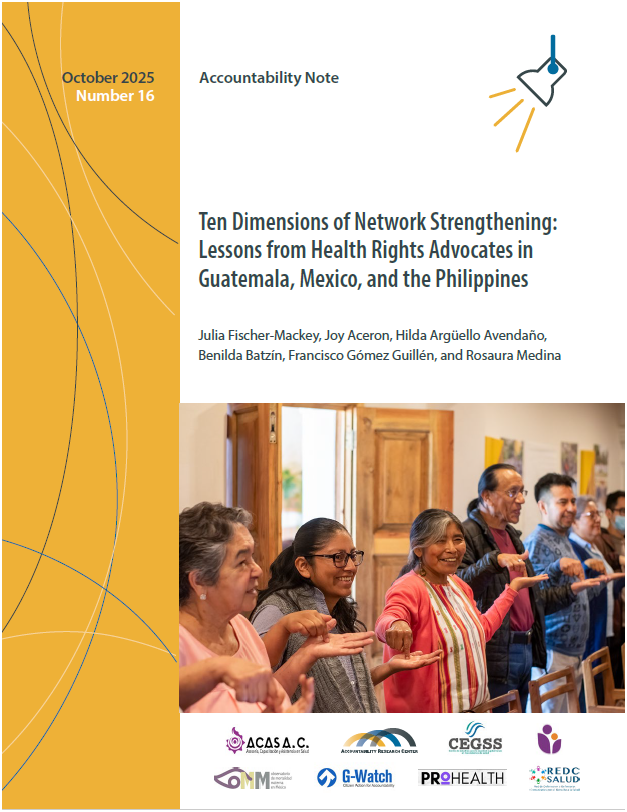
Ten Dimensions of Network Strengthening: Lessons from Health Rights Advocates in Guatemala, Mexico, and the Philippines
Date: October 2025
Author(s): Julia Fischer-Mackey, Joy Aceron, Hilda Argüello Avendaño, Benilda Batzín, Francisco Gómez Guillén, and Rosaura Medina
Publication type: ARC Accountability Note
Published by: Accountability Research Center
Read a two-page summary here.
Maintaining and strengthening networks of volunteers is central to the health rights advocacy work of four civil society organizations (CSOs) in Guatemala, Mexico, and the Philippines who have worked through networks to improve reproductive, maternal, newborn, child, and adolescent healthcare (RMNCAH) services for marginalized communities. Their experience shows that networks of volunteers that represent marginalized populations and have the skills to engage with public authorities at different levels of government can confront the political and policy issues necessary to improve RMNCAH care.
This Accountability Note captures the reflections of these CSOs on ten dimensions of network strengthening that they consider critical to their efforts to strengthen volunteer networks.
Julia Fischer-Mackey, PhD, is a researcher and learning advisor with the Accountability Research Center. Her research focuses on the politics of evidence and making social research more useful to those working for social change. She has provided research, evaluation, and learning support to organizations working in global public health, climate resilience, food systems, gender equity, financial inclusion, education, and children’s wellbeing.
Joy Aceron, MPA, is Convenor-Director of G-Watch, a citizen action movement for accountability in the Philippines that aims to improve governance of public services and to deepen democracy. She has more than two decades of experience with civil society–government engagement for public accountability.
Hilda E. Argüello Avendaño, M.D., PhD, coordinates the OMM in Mexico and is a member of the civil association ACASAC. Her research focuses on monitoring health services; transparency and accountability in maternal health in Mexico; midwifery; maternal mortality in indigenous areas; sexual and reproductive health of indigenous adolescents; and access to health services.
Benilda Batzín is Director of CEGSS. She serves as a liaison between CEGSS staff and the REDC-Salud defenders, provides accompaniment and capacity building to defenders, and coordinates strategy to achieve health rights for indigenous populations throughout Guatemala. She is a social worker by training and has been working with indigenous communities for over 20 years.
Francisco Gómez Guillén is currently a researcher at the OMM and a doctoral student in social anthropology at CIESAS. He is an active member of ACASAC and a member of various networks of rights defenders. He has focused on working with indigenous populations, sexual and reproductive rights, gender, and masculinities. He is an anthropologist by training and has been working in civil society organizations for 14 years.
Rosaura Medina is Deputy Director of CEGSS, where she manages the fieldwork of the technical team across five regions of Guatemala. She coordinates and supports their training and accompaniment of REDC-Salud members as they conduct citizen monitoring, advocacy, and accompaniment of citizens seeking care from the public health system. She has a degree in Education and Human Rights and has been working for more than 19 years with indigenous
communities that fight for and defend the human rights of indigenous peoples in Guatemala.
